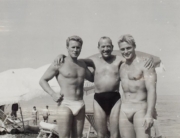
Reem Abdullah, in the foreground, in WADJDA (All photos: Venice Film Festival)
I don’t want to say that the European auteur film has hit a dry spell (although it did cross my mind), but many such films either fell flat or seemed too familiar in the opening six days of this year’s Venice Film Festival—at least nine were all-out disappointments. Thankfully, three films, all from the Middle East, have grabbed the spotlight, representing some of the best of the 26 films I’ve seen so far in the festival. In fact, unlike my last time here in 2009, it took three days until I saw anything I’d strongly recommend. Even Venice veterans were commiserating that this has been one of the weakest line-ups in years, especially in the competition section. Still, patience has its rewards. Just when I might give up, a film comes down the pipeline that takes me by surprise, like Wadjda, the first full-length film shot entirely in Saudi Arabia and, notably, by a woman, Haifaa Al Mansour.
Funded by European companies and backed by the Sundance Institute, Wadjda doesn’t merely illustrate the role of females in contemporary Saudi Arabia. It engages largely because of its rebellious title character, an enterprising, plucky, and very obstinate 10-year-old girl. You can count the ways she repeatedly violates the moral code: she lives independently, not caring to wear her head scarf in public or whether men see her playing hopscotch in the school yard (both a social prohibition). She bargains, haggles, and performs odd jobs, anything to earn enough money to buy a bike so she can beat a neighborhood boy at a race—even though females are discouraged to ride one. And with very little thought of the consequences, she enters a Koran recitation contest in school in order to win the prize money.
What sets this film apart from so many coming-of-agers is the relationship between Wadjda and her 30-something mother (played by a Saudi television star, Reem Abdullah). The two essentially live alone in suburban Riyadh since Wadjda’s father makes an appearance at home every couple of weeks. The mother has heard rumors that he’s in the market for a second wife: he wants a son, but she can’t have more children. Al Mansour’s script fluidly weaves in the facts of the social expectations for females, and displays an exceptional skill bringing out a varied and unguarded performances from her lead actress, Waad Mohammed, and from the ensemble playing the girl’s classmates.

Hadas Yaron in FILL THE VOID (Lemale Et Ha’Chalal)
Her script also bears the stamp of its development at the Sundance Institute: a crystal-clear storyline developed within a three-act structure. Another noteworthy film (and fellow graduate of the Sundance Institute), Fill the Void, also comes armed with a well-written screenplay. A New Yorker now living in Israel, director Rama Burstein has made a debut film that has been rightfully programmed into the Venice competition. For its clarity and lack of pretension, Void stands apart. Burstein has said in interviews that she wanted to make a film for and about Orthodox Israelis, of which she is one. And her mission is palpable. The film gets right to the point and never loses focus. It’s beautifully acted, and though filmed largely in cramped interiors, it has a great sense of composition that reveals relationships without fussiness.
In the very first scene, 18-year-old Shira and her matchmaker prowl a supermarket aisle to catch a glimpse of a prospective husband, but in order for this obedient daughter to get married, protracted negotiations, delays, machinations (obvious and covert) ensue. It’s also important to note that the film accepts arranged marriages and the segregation of gender roles as a point of fact, not an issue of debate.
In her star-making lead role, actress Hada Yaron, who plays Shira, could win the festival’s most promising actor award, just for her reaction in the scene when a potential suitor tells her she’s pretty—probably the first time Shira’s heard this compliment from a man. (The red carpet paparazzi loved Yaron. She seemed a little bit bewildered by the corps of snapping photographers, but maintained her poise.)
It would be hard for another film to challenge or top the urgency propelling El sheita elli fat (Winter of Discontent), which started production during Egypt’s Arab Spring, shortly before Hosni Mubarak stepped down from the country’s presidency—the film makes one think of the clandestine filming of Open City. Filmmaker Ibrahim El Batout had one advantage over Roberto Rossellini, though; he didn’t have to scavenge for film stock. Instead, he shot his film beautifully with a digital camera.
The well titled debut film has a cool and steady intensity. One thread follows the political developments as they develop on the streets and in Tahrir Square in January and February of 2011, interwoven with the incarceration of Amr (Amr Waked) and his torturous imprisonment by the state security officers two years earlier. El Batout directs his cast of activists with an assured hand, and the script connects the characters in ways that you can’t always foresee.
The film’s relevancy speaks for itself. The closing credits reveal one of the actors died under military custody just last October. A few years ago, the Egyptian fiery anti-sexual harassment drama Cairo 678 found an international audience. Winter of Discontent deserves the same.

Mikkel (Johan Philip Asbaek) held at gunpoint in KAPRINGEN (A HIJACKING)
It would be reckless to imply that there was nothing emerging on the horizon in Europe. The title of the Danish film Kapringen (A Hijacking) plainly states what it’s all about: Somali pirates take over a vessel off the coast of Africa, and they want $15 million. Against the advice of a hostage specialist, the shipping company’s head honcho, Peter Ludvigsen (a steely Soren Malling), insists on personally negotiating with the pirates. It’s his company, and he’s responsible for the lives of the crew, or so he reasons. However, through the terse opening sequence, the audience already knows Peter’s modus operandi: he always sets out to win and knows what next move to make. Wearing a poker face, he barely changes expressions, whether talking to a colleague or his wife. He takes on all challengers, but he has absolutely no idea what’s happening thousands of miles away to his employees who are starving and not allowed out of their cramped quarters to use the toilet. Thankfully the film is not in Smell-O-Vision.
The script steadily ramps up the tension when the negotiations, which go on for months, stall, and by following what happens to the ship’s cherubic cook, Mikkel Hartmann (Johan Philip Asbaek), who stands in for the everyman. Meanwhile, Peter continues bargaining with the captors as if he’s in a boardroom, but he disobeys a golden rule: never show emotion, or the hostage takers will know that they have you. This sharp psychological drama should serve as a calling card for the lean-and-mean sophomore director Tobias Lindholm (also co-writer of The Hunt). At the film’s premiere in Sala Grande, the paparazzi didn’t know what it was missing. There were no photographers for the arrival of the director and his male cast (granted the photographers favor actresses in designer frocks), but Lindholm is one to watch out for. No one should be surprised if he comes right back.
Finally, the following summaries came about after I saw the Hemingway game play out in the Argentinean film Leones in the festival—the objective, to create a story in six words or less, as in “For Sale: Baby shoes, never worn.” Here’s a brief rundown of other festival films:
Ramin Bahrani’s At Any Price: Middling Arthur Miller-esque Iowa farm meltdown
From Sweden, Blondie: Three angry sisters, one absent mother
Carmen Comes Home (Japan’s first color feature film from 1951): Postwar farm girl returns home stripping
Russia’s Izemna (Betrayal): Death comes as a beautiful blonde
Paul Thomas Anderson’s The Master: New religion emerges; actors eat scenery
Provocateur Ulrich Seidl’s Paradise: Faith: Fanaticism, flagellation, crucifix sexually violated
The Paris-set Queen of Montreuil: Widow, homeless Icelanders form quirky family
Superstar, with Belgium star Cécile de France: Putz suddenly becomes famous; Network-lite satire
Terrence Malick’s To the Wonder: Oklahoma is as beautiful as France






Leave A Comment